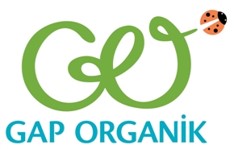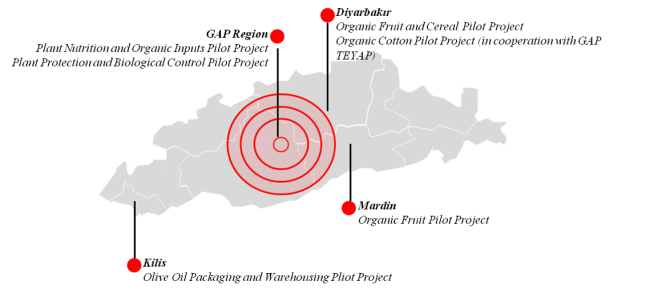GAP Organic Agriculture Cluster Project
 GAP Organic Agriculture Cluster Project is being implemented by the Southeast Anatolia Project Regional Development Administration (GAP RDA) of Ministry of Development with the technical assistance of United Nations Development Programme (UNDP). The Project, which was initiated in 2009 and expected to be completed in 2013, has an overall budget of 6.5 million TL.
GAP Organic Agriculture Cluster Project is being implemented by the Southeast Anatolia Project Regional Development Administration (GAP RDA) of Ministry of Development with the technical assistance of United Nations Development Programme (UNDP). The Project, which was initiated in 2009 and expected to be completed in 2013, has an overall budget of 6.5 million TL.
Background of the Project
Southeast Anatolia Region is one of the lagging regions of Turkey in terms of socio-economic development. As per 2003 socio-economic development index which is developed by the Ministry of Development, the Southeast Anatolia is the second least developed region of Turkey. Agriculture and trade are the leading economic activities of the Region. Although the Region has the potentials of various factors of production such as land, water, natural resources etc., most of the production activities are concentrated on low value added segments of the value chains. Organic agriculture has the potential to pave the way for the production of high value added products and hence contribute to the development of the Region in a sustainable way through utilizing these favourable regional factors of production. However, the Region hasn’t fully utilized its organic agriculture potential so far.
Organic agriculture has also been one of the major sectors that were prioritized within the scope the Competitiveness Agenda, which was developed for the Southeast Anatolia Region. In this sense, organic agriculture has been incorporated into the GAP Action Plan which was announced and introduced in 2008. GAP Organic Agriculture Cluster Project is being implemented in line with the priorities proposed in the action plan.
Overall Objective and Purpose
The Project aims at improving the competitiveness of the organic agriculture sector in Southeast Anatolia Region and hence contributing to the development of the Region in a sustainable and socially equitable manner.
In parallel with this overall objective, the Project aims at utilization of organic agriculture potentials of the Region. In addition, with a view to contributing to the improvement of the competitiveness of the organic food and textile sectors, the Project also aims at establishment and development of required technical, physical, knowledge and institutional infrastructures for these sectors.
Cluster Roadmap and Common Vision
Within the scope of the GAP Organic Agriculture Cluster Roadmap, which was developed through the contributions of all concerned stakeholders in a consultative process, the common vision for the Region was set as “By 2023, Turkey's leading supplier of organic textiles and food raw material, and innovative and competitive organic production attraction center with its broad and fertile irrigated agricultural land”. The common vision was endorsed and owned by the cluster members.
Key Success Factors
In order to achieve the overall objective; strengthening inter-institutional collaboration, establishing a strong production and marketing infrastructure and generation of replicable and scalable success stories with a view to disseminating organic agriculture practices across the Region, have been identified as the key success factors. It is aimed to increase the competitiveness of the GAP Organic Agriculture Cluster both at national and international levels through strengthening inter-institutional collaboration, production and marketing infrastructure, whereas the scalable and replicable success stories are expected to contribute to the dissemination of organic agriculture practices as well as processing of high value added organic products in the Region.
Cluster Governance Structure
In line with the common vision, with a view to design, implement, monitor and coordinate actions laid down in the Cluster Roadmap, composed of the representatives of the public sector, private sector, academia and civil society organizations, a cluster governance structure has been established. In this respect, an Advisory Board, a Management Board and five working groups have been established and are presently operational.
- Marketing and Branding Working Group: The major areas of responsibility for this working group are to develop and implement promotion, branding and visibility strategies required for cluster’s accession to the international value chains and markets; and to provide technical assistance for the development and maintenance of the GAP Organic Agriculture Portal, which will be established within the scope of the Project.
- Organic Food Working Group: Analysis and planning of producing alternative organic products in the GAP Region, assessment of organic production potentials, and design and delivery of awareness raising activities are among the main activities of this working group.
- Organic Textile Working Group: The main activities of this working group are to promote merits of transition to organic cotton production in the Region, to attract new investments to the Region in organic textiles sector and to facilitate new contracts in organic textiles through intense awareness-raising programmes and promotional activities.
- Organic Agriculture Consultancy Centre Working Group: The main activities of this working group are to provide technical assistance during the establishment and operationalization phase of the Centre, which will provide information, advisory and consultancy services to the institutions, producers and companies operating in organic agriculture sector.
- Institutional Capacity Building Working Group: The main activities of this working group focus on assessment and improvement of institutional capacities and competencies with a view to effectively implement the actions laid down in the Cluster Roadmap by the concerned cluster members and to ensure sustainability of the activities and the outputs of the Project.
Pilot Projects
Although there are farmers who deal with organic farming and producers who process organic products in the Region, it is hard to state that there are success stories in the Region which demonstrate the economic and social benefits of organic farming and hence help disseminate organic agriculture practices across the Region. In this respect, through generating replicable and scalable success stories, the Project aims at disseminating organic agriculture practices in the Region.

Highlights on the Status of the Project Activities
- The business plans of the thematic working groups have been developed. The Working Groups are currently carrying out the activities set forth in the business plans,
- The feasibility studies and the operationalization plans for the pilot projects have been developed and the pilot projects have been initiated,
- The technical infrastructure of the GAP Organic Portal (www.gaporganik.org) has been established and the said portal will be deployed in the second half of 2013,
- Activities for the establishment and operationalization of GAP Consultancy and Dissemination Centre have been initiated,
- Institutional needs of the cluster members and various constituents of the cluster have been assessed and corresponding institutional development programmes have been designed and (partly) delivered.
- Regional, national, inter-cluster and international networks are being established within the scope of the Project
- Activities for scaling up and replication of the strategic project outputs including but not limited to the pilot initiatives, have been initiated.

















